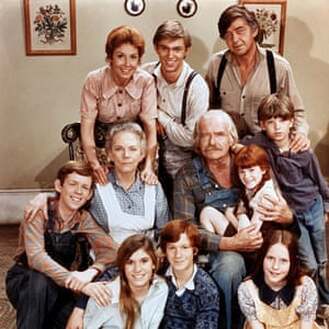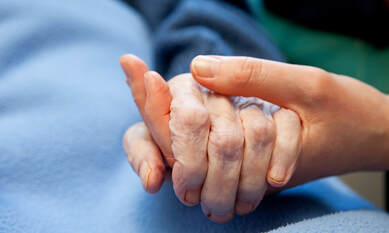
When considering the high rate of climate-change denial among senior citizens -- see previous blog post -- it's easy to dismiss them as out-of-touch, preoccupied with their signature issues (protection of Social Security and Medicare, primarily) and, in the case of the conservative elderly, wedded to the science-doubting policy positions of their political tribe. While those assertions contain some truth, they're also glib and superficial, lacking in context. As we know, or should, context is crucial.
How do most senior citizens in the United States actually live? Not together -- only seven percent of seniors live in nursing homes, assisted living facilities and supportive retirement communities. Not with their kids and grandkids -- only 20 percent of seniors live within so-called intergenerational families, dramatized for this viewer by 1970s TV shows such as The Waltons. Today, almost three-quarters of seniors live alone or with a spouse/roommate in a house, condo or apartment.
And then the spouse, friend or sister dies. Another person is added to the nation of solitary elderly, segregated from mainstream society. In fact, half of women over 75 live alone. Alone, watching TV for an average of seven hours per day. Alone, struggling to care for themselves and their property. According to a 2019 Pew study, Americans over age 60 exist alone for more than half of their waking days, not including time for personal grooming. Alone, with their thoughts and memories. Alone, with their anxiety and grudges.
Is there a TV show that dramatizes this sad reality? Who would watch it?
How do most senior citizens in the United States actually live? Not together -- only seven percent of seniors live in nursing homes, assisted living facilities and supportive retirement communities. Not with their kids and grandkids -- only 20 percent of seniors live within so-called intergenerational families, dramatized for this viewer by 1970s TV shows such as The Waltons. Today, almost three-quarters of seniors live alone or with a spouse/roommate in a house, condo or apartment.
And then the spouse, friend or sister dies. Another person is added to the nation of solitary elderly, segregated from mainstream society. In fact, half of women over 75 live alone. Alone, watching TV for an average of seven hours per day. Alone, struggling to care for themselves and their property. According to a 2019 Pew study, Americans over age 60 exist alone for more than half of their waking days, not including time for personal grooming. Alone, with their thoughts and memories. Alone, with their anxiety and grudges.
Is there a TV show that dramatizes this sad reality? Who would watch it?

You might say that many seniors don’t want to live with their children. They want their independence, don’t want to be a burden – and I understand that. That's how my mother felt as she moved from house to condo to independent living facility to nursing home. But here's the flip side of that equation: who wants to live where they’re not wanted? Where they're considered incompetent, helpless and complaining. It's no wonder Gram and Gramps have been nuked from the nuclear family. Perhaps it's also no wonder that many seniors are not inclined to embrace grand initiatives, such as preventing further climate change, that will benefit the very people who have exiled them.
On a simmering, subconscious level that's just too painful to access, many senior citizens are angry at their children and grandchildren. Screw 'em. Let 'em figure it out, invent some fancy App to fix the planet. Then the big shrug: what's the difference, I'm gonna die soon anyway. Such feelings are understandable, but also run counter to the powerful, universal urge that motivates most parents: to create a better future for their children. Moreover, abdicating responsibility violates the rules of courtesy, a virtue prized among older generations. You clean up your mess before bugging out.
On a simmering, subconscious level that's just too painful to access, many senior citizens are angry at their children and grandchildren. Screw 'em. Let 'em figure it out, invent some fancy App to fix the planet. Then the big shrug: what's the difference, I'm gonna die soon anyway. Such feelings are understandable, but also run counter to the powerful, universal urge that motivates most parents: to create a better future for their children. Moreover, abdicating responsibility violates the rules of courtesy, a virtue prized among older generations. You clean up your mess before bugging out.

Screw 'em, help 'em. Screw 'em, help 'em. As the Israelis say, it's a real balagan. Oh, what churns beneath the surface of every long-lived human being! Now, I don't pretend to know how to resolve such dissonance, to bridge a generation gap swirling with mixed emotions, but I do know that discussing these dynamics is a good start. Sometimes it can be liberating to reach across the divide and acknowledge our motivations and behaviors.
Yesterday, after visiting my mother at her nursing home, I stood in the lobby waiting for my ride. Grimly I mulled over the difficulties of getting her the hearing aid that she needs and will probably reject. Nearby I spied Rose, one of my mom's bingo pals, in her wheelchair. Across from her sat a young man in his twenties. He was dressed in black, his hair cut in a slant that seemed both futuristic and retro. His arm was stretched out and in his hand he held Rose's hand. He looked into her eyes, nodding as she talked. No glances at his smart phone, nothing else but her.
Okay, I thought, there's hope yet.
Yesterday, after visiting my mother at her nursing home, I stood in the lobby waiting for my ride. Grimly I mulled over the difficulties of getting her the hearing aid that she needs and will probably reject. Nearby I spied Rose, one of my mom's bingo pals, in her wheelchair. Across from her sat a young man in his twenties. He was dressed in black, his hair cut in a slant that seemed both futuristic and retro. His arm was stretched out and in his hand he held Rose's hand. He looked into her eyes, nodding as she talked. No glances at his smart phone, nothing else but her.
Okay, I thought, there's hope yet.
 RSS Feed
RSS Feed